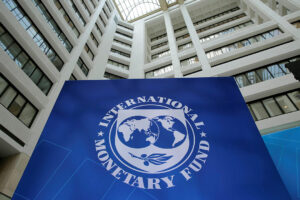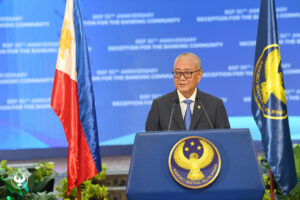
PHL current account deficit seen to narrow this year – IMF

The International Monetary Fund (IMF) expects the Philippines’ current account deficit to narrow this year.
“The current account deficit is projected to narrow from 3.8% of gross domestic product (GDP) in 2024 to 3.4% of GDP in 2025, supported by weaker commodity prices,” IMF Mission Chief Elif Arbatli Saxegaard said in a statement.
Latest data from the Bangko Sentral ng Pilipinas (BSP) showed the current account deficit widened by 41.4% to $17.5 billion last year from $12.4 billion in 2023. This brought the current account to 3.8% of economic output in 2024 from the 2.8% the year prior.
The central bank expects the current account deficit — which covers transactions involving goods, services, and income — to reach $19.8 billion this year, equivalent to 3.9% of GDP.
Ms. Saxegaard also noted that while the country’s gross international reserves (GIR) have declined since the record-high in September, the dollar reserve level remains adequate.
The Philippines’ GIR declined by 1.9% to $104.6 billion as of end-April from $106.7 billion as of end-March, BSP data showed. Dollar reserves hit a record $112 billion in September 2024.
Meanwhile, the multilateral institution said it remains critical that the Philippines sticks to its medium-term fiscal consolidation path.
This will also require “sustained and durable efforts to mobilize tax revenues and ensure efficiency of government spending,” it added.
Ms. Saxegaard said the government’s fiscal stance will likely be broadly neutral this year.
“The medium-term fiscal consolidation remains appropriate and should be supported by a sustainable plan to raise tax revenues and implement expenditure reforms to ensure that deficit targets are met and to create more space for priority spending.”
Under the latest Development Budget Coordination Committee (DBCC) figures, the NG capped its deficit ceiling at 5.3% of GDP this year.
“Tax reforms could prioritize raising excise taxes, enhancing VAT efficiency, improving tax administration, and ensuring effective control of tax incentives. Efforts to enhance public financial management and manage fiscal risks should continue.”
“Enhancing capacity at the local government level to execute additional spending responsibilities in line with the higher revenues allocated to them in the decentralization process is critical to support growth,” she added.
Ms. Saxegaard led an IMF team during its meetings in Manila from May 14 to 20.
For the coming months, she said the IMF will continue its dialogue in the context of this year’s Article IV Consultation. — Luisa Maria Jacinta C. Jocson



